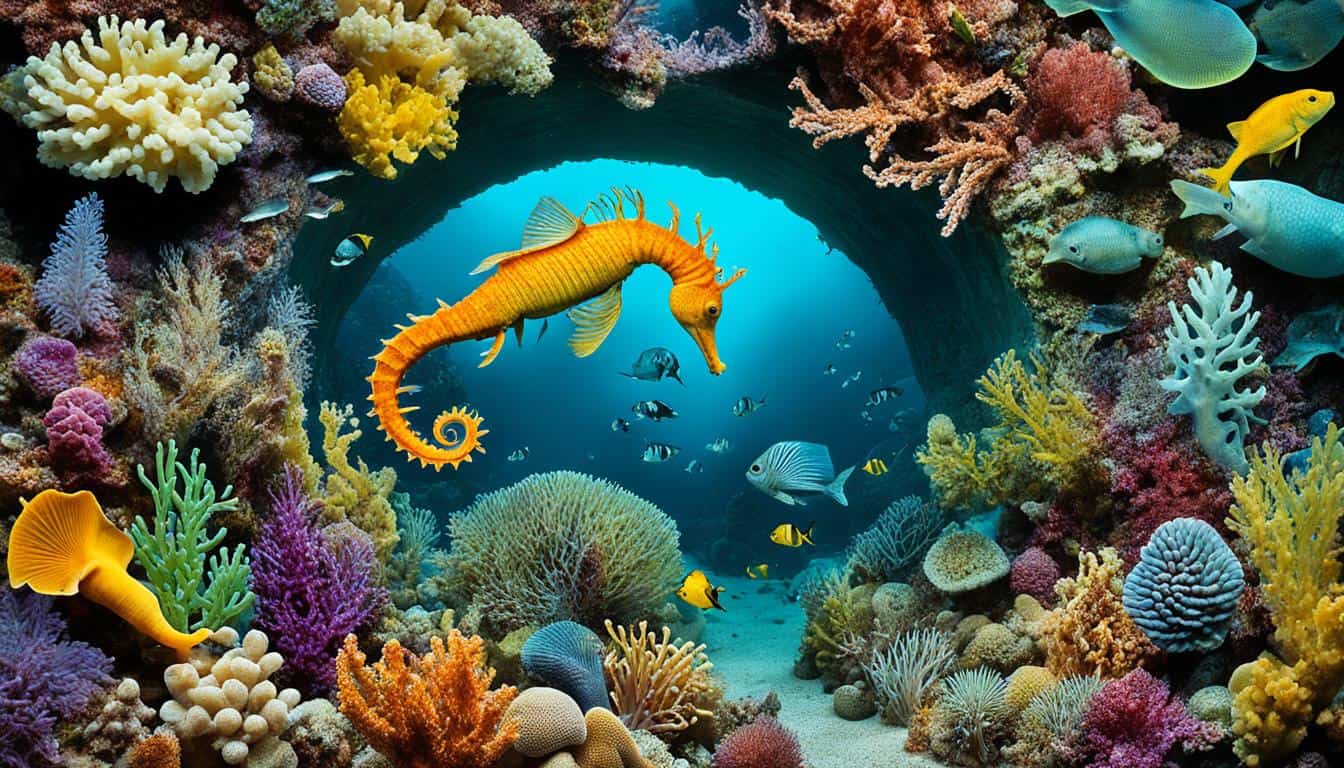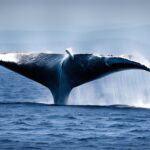Have you ever thought about if seahorses are endangered? These fascinating creatures are now a big concern for conservationists. They are important for the health of our oceans. Sadly, they face a high risk of disappearing due to many factors.
About 150 million seahorses are taken from the ocean every year. This is mainly for the aquarium trade and traditional medicine. It’s vital to know about the seahorse’s conservation status to help protect them.
Understanding Seahorse Species
To truly appreciate seahorses, we must delve into their taxonomy and unique traits. These marine wonders belong to the Syngnathidae family and Hippocampus genus. They include over 50 recognized species, each with its own set of features and adaptations.
Overview of Seahorse Taxonomy
Seahorses are classified into different species based on their looks and genes. They are closely related to pipefish and seadragons, forming a distinct group of bony fish. Taxonomists have identified various genera and species, showing a wide range of sizes, colors, and habitats. This classification helps us understand their diversity and evolution.
Unique Characteristics of Seahorses
One of the most striking traits of seahorses is their ability to change color. This helps them hide from predators and survive in different environments. Their snouts are long, perfect for feeding. They don’t have teeth and have a special fin that lets them move through plants easily.
Another unique feature is that males become pregnant. This is rare in the animal world. It shows how seahorses have evolved unique ways to reproduce.
Seahorse Conservation Status
The conservation status of seahorses is a big concern. They are listed on the IUCN Red List, which shows the challenges they face. This list helps us understand how hard it is for them to survive.
IUCN Red List Categories
The IUCN Red List sorts species by their risk of going extinct. The Cape seahorse is listed as Endangered (EN), meaning it’s at high risk. Many others are listed as Vulnerable (VU). Sadly, some are marked as Data Deficient (DD), meaning we don’t have enough info to fully assess their risk.
Current Threat Levels for Seahorses
Seahorses are facing many threats that put their survival at risk. Overfishing and losing their homes are big problems. Many seahorse species are seeing their numbers drop sharply. Without help, these species could face even bigger challenges, making conservation efforts more critical.
| Seahorse Species | IUCN Category | Current Threats |
|---|---|---|
| Cape Seahorse | Endangered (EN) | Overfishing, Habitat Loss |
| Spiny Seahorse | Vulnerable (VU) | Bycatch, Habitat Degradation |
| Longsnout Seahorse | Data Deficient (DD) | Overfishing, Pollution |
Are Seahorses Endangered?
Many seahorse species are facing big risks, making us ask, are seahorses endangered? Research shows their numbers are dropping fast. This calls for quick action to save these special sea animals.
Species at Risk of Extinction
Some seahorses are very close to disappearing forever. The thorny seahorse and the hedgehog seahorse are in danger. We don’t have all the facts yet, but we know many are struggling.
We need more studies to understand which ones are hit the hardest. This highlights the importance of spreading the word and helping these animals.
Global Population Trends
Seahorse populations around the world are going down fast. The IUCN says over 50% have disappeared in just five years. Things like destroying their homes and overfishing are to blame.
This situation is very serious. We must act now to save these amazing creatures. If we don’t, they might not be here much longer.
Threats to Seahorses
Seahorses face many challenges in today’s fast-changing world. Their survival is at risk due to several factors. These threats greatly affect their numbers and where they live.
Overfishing and Bycatch Issues
Overfishing is a big threat to seahorses. They often get caught by accident during fishing trips. This happens a lot in places like Florida and South America, where seahorses are disappearing.
Many fishing methods don’t protect these fragile creatures. This means seahorses are in danger of disappearing.
Impact of Habitat Destruction
Habitat destruction is also a big problem for seahorses. Things like building cities and tourism harm their homes, like seagrass beds and coral reefs. These places are crucial for seahorses to live and breed.
When these areas are destroyed, seahorses find it hard to survive.
Pollution and Climate Change Effects
Pollution is another danger for seahorses. Pollutants from land, like chemicals and plastics, enter the ocean. This harms their homes and the creatures they need to live.
Climate change, with its rising ocean temperatures and acid levels, makes things worse. These problems together increase the risk of seahorses going extinct.

Importance of Seahorses in Marine Ecosystems
Seahorses are key to the health of marine ecosystems. They show us how well their homes are doing. By studying them, we learn how to keep the ocean balanced.
Role as Flagship Species
Seahorses are important for saving marine life. They grab people’s attention with their looks and actions. This helps spread the word about the dangers facing their homes.
- Seahorses serve as a reference point for conservationists and researchers.
- They play a vital role in promoting habitat protection, especially in coral reefs and seagrass beds.
- Their plight often stirs public interest, aiding fundraising and conservation initiatives.
Ecological Impact of Seahorse Decline
When seahorse numbers go down, it’s bad news for the ocean. It messes with the food chain and harms their homes.
- A decrease in seahorse numbers can destabilize the food chain.
- Loss of seahorses affects fish populations, which rely on them for predation.
- The decline can lead to diminished coral reef health due to overpopulation of other species.
Seeing how vital seahorses are shows why we must save them. By protecting these creatures, we help make the ocean richer and healthier for all.
Seahorse Conservation Efforts
Many organizations are working hard to save seahorses and their homes. Groups like Save Our Seahorses and the Seahorse Trust lead the charge. They do research, take action, and spread the word about why seahorses matter.
Organizations Working to Protect Seahorses
Non-profits and research centers team up to protect seahorses. They teach people and push for sustainable ways to live. This helps both the ocean and local communities.
The fishing industry is also joining in. They work together to keep seahorse homes safe.
Global Initiatives for Marine Conservation
Big efforts are happening worldwide to protect seahorses. They work on trade rules and making safe areas in the ocean. This helps fishermen and keeps seahorses safe.
You can help too. By joining these efforts, you help protect seahorses and make the ocean healthier. This way, future generations can enjoy these amazing fish.
FAQ
Are seahorses endangered?
Yes, many seahorse species are endangered or vulnerable. The Cape seahorse is one example. We need to act fast to save them.
What is the current conservation status of seahorses?
Seahorses are in danger, with some species not even listed. We need to assess them better to know how to help.
What are the threats to seahorses?
Seahorses face threats like overfishing, habitat loss, pollution, and climate change. These threats are harming their numbers and homes.
How have seahorse populations changed globally?
In the last five years, seahorse numbers have dropped by over 50%. Overfishing and losing their homes are the main reasons.
What is the role of seahorses in their ecosystems?
Seahorses show how healthy marine habitats are. If they decline, it can disrupt the food chain and harm marine life.
What organizations are focused on seahorse conservation?
Groups like Save Our Seahorses and the Seahorse Trust work to protect them. They focus on research and spreading the word about sustainable fishing and protecting their homes.
How can I help protect seahorses?
You can help by spreading awareness, using less plastic, choosing sustainable seafood, and giving to marine conservation groups.
Why is protecting seahorse habitats important?
Keeping their homes safe, like coral reefs and seagrass beds, is key to their survival. Healthy habitats mean a diverse ocean life.







